- Home
- Christopher Paolini
Brisingr [en] i-3 Page 13
Brisingr [en] i-3 Read online
Page 13
“My Lady, may I tend to you?” asked Farica, her expression both concerned and hesitant, as if she were uncertain how Nasuada would react.
Nasuada nodded her approval.
As Farica began to wind strips of linen around her arms, Naako and Ramusewa approached. They bowed, and Ramusewa said, “Never before has anyone endured so many cuts in the Trial of the Long Knives. Both you and Fadawar proved your mettle, but you are undoubtedly the victor. We shall tell our people of your achievement, and they shall give you their fealty.”
“Thank you,” said Nasuada. She closed her eyes as the throbbing in her arms increased.
“My Lady.”
Around her, Nasuada heard a confused medley of sounds, which she made no effort to decipher, preferring instead to retreat deep inside herself, where her pain was no longer so immediate and menacing. She floated in the womb of a boundless black space, illuminated by formless blobs of ever-changing color.
Her respite was interrupted by the voice of Trianna as the sorceress said, “Leave off what you’re doing, handmaid, and remove those bandages so I can heal your mistress.”
Nasuada opened her eyes to see Jörmundur, King Orrin, and Trianna standing over her. Fadawar and his men had departed the pavilion. “No,” said Nasuada.
The group looked at her with surprise, and then Jörmundur said, “Nasuada, your thoughts are clouded. The trial is over. You don’t have to live with these cuts any longer. In any event, we have to stanch your bleeding.”
“Farica is doing that well enough as is. I shall have a healer stitch my wounds and make a poultice to reduce the swelling, and that is all.”
“But why!”
“The Trial of the Long Knives requires participants to allow their wounds to heal at their natural pace. Otherwise, we won’t have experienced the full measure of pain the trial entails. If I violate the rule, Fadawar will be declared the victor.”
“Will you at least allow me to alleviate your suffering?” asked Trianna. “I know several spells that can eliminate any amount of pain. If you had consulted me beforehand, I could have arranged it so that you could lop off an entire limb without the slightest discomfort.”
Nasuada laughed and allowed her head to loll to the side, feeling rather giddy. “My answer would have been the same then as it is now: trickery is dishonorable. I had to win the trial without deceit so no one can question my leadership in the future.”
In a deadly soft tone, King Orrin said, “But what if you had lost?”
“I could not lose. Even if it meant my death, I never would have allowed Fadawar to gain control of the Varden.”
Grave, Orrin studied her for a long while. “I believe you. Only, is the tribes’ loyalty worth such a great sacrifice? You are not so common that we can easily replace you.”
“The tribes’ loyalty? No. But this will have an effect far beyond the tribes, as you must know. It should help unify our forces. And that is a prize valuable enough for me to willingly brave a host of unpleasant deaths.”
“Pray tell, what would the Varden have gained if you had died today? No benefit would exist then. Your legacy would be discouragement, chaos, and likely ruin.”
Whenever Nasuada drank wine, mead, and especially strong spirits, she became most cautious with her speech and motions, for even if she did not notice it at once, she knew the alcohol degraded her judgment and coordination, and she had no desire to behave inappropriately or to give others an advantage in their dealings with her.
Pain-drunk as she was, she later realized she should have been as vigilant in her discussion with Orrin as if she had imbibed three tankards of the dwarves’ blackberry-honey mead. If she had, her well-developed sense of courtesy would have prevented her from replying so: “You worry like an old man, Orrin. I had to do this, and it is done. ’Tis bootless to fret about it now... I took a risk, yes. But we cannot defeat Galbatorix unless we dance along the very cliff edge of disaster. You are a king. You ought to understand that danger is the mantle a person assumes when he — or she — has the arrogance to decide the fates of other men.”
“I understand well enough,” growled Orrin. “My family and I have defended Surda against the Empire’s encroachment every day of our lives for generations, while the Varden merely hid in Farthen Dûr and leeched off Hrothgar’s generosity.” His robes swirled about him as he turned and stalked out of the pavilion.
“That was badly handled, my Lady,” observed Jörmundur.
Nasuada winced as Farica tugged on her bandages. “I know,” she gasped. “I’ll mend his broken pride tomorrow.”
WINGED TIDINGS
A gap appeared then in Nasuada’s memories: an absence of sensory information so complete, she only became aware of the missing time when it dawned upon her that Jörmundur was shaking her shoulder and saying something loudly. It took her several moments to decipher the sounds coming out of his mouth, and then she heard: “... keep looking at me, blast it! That’s the thing! Don’t go to sleep again. You won’t wake up again if you do.”
“You can let go of me, Jörmundur,” she said, and mustered a weak smile. “I’m all right now.”
“And my uncle Undset was an elf.”
“Wasn’t he?”
“Bah! You are the same as your father: always ignoring caution when it comes to your own safety. The tribes can rot in their bloody old customs, for all I care. Let a healer at you. You’re in no condition to make decisions.”
“That’s why I waited until it was evening. See, the sun is almost down. I can rest tonight, and tomorrow I will be able to deal with the affairs that require my attention.”
Farica appeared from the side and hovered over Nasuada. “Oh, Ma’am, you gave us quite a fright there.”
“Still are, as a matter of fact,” muttered Jörmundur.
“Well, I’m better now.” Nasuada pushed herself upright in the chair, ignoring the heat from her forearms. “You can both go; I shall be fine. Jörmundur, send word to Fadawar that he may remain chief of his own tribe, so long as he swears loyalty to me as his warlord. He is too skilled a leader to waste. And, Farica, on your way back to your tent, please inform Angela the herbalist that I require her services. She agreed to mix some tonics and poultices for me.”
“I won’t leave you alone in this condition,” declared Jörmundur.
Farica nodded. “Begging your pardon, my Lady, but I agree with him. It’s not safe.”
Nasuada glanced toward the entrance to the pavilion, to ensure none of the Nighthawks were close enough to overhear, and then dropped her voice into a low whisper. “I shall not be alone.” Jörmundur’s eyebrows shot up, and an alarmed expression crossed Farica’s face. “I am never alone. Do you understand?”
“You have taken certain... precautions, my Lady?” asked Jörmundur.
“I have.”
Both her caretakers appeared uneasy with her assurance, and Jörmundur said, “Nasuada, your safety is my responsibility; I need to know what additional protection you may have and who exactly has access to your person.”
“No,” she said gently. Seeing the hurt and indignation that appeared in Jörmundur’s eyes, she continued. “It’s not that I doubt your loyalty — far from it. Only, this I must have for myself. For the sake of my own peace of mind, I need to have a dagger no one else can see: a hidden weapon tucked up my sleeve, if you will. Consider it a flaw in my character, but do not torment yourself by imagining my choice is in any way a criticism of how you perform your duties.”
“My Lady.” Jörmundur bowed, a formality he almost never used with her.
Nasuada lifted her hand, indicating her permission for them to leave, and Jörmundur and Farica hurried from the red pavilion.
For a long minute, perhaps two, the only sound Nasuada heard was the harsh cry of gore-crows circling above the Varden’s encampment. Then, from behind her, there came a slight rustling, like that of a mouse nosing about for food. Turning her head, she saw Elva slip out of her hiding place, emerging between two panels o
f fabric into the main chamber of the pavilion.
Nasuada studied her.
The girl’s unnatural growth had continued. When Nasuada first met her but a short while ago, Elva had appeared between three and four years old. Now she looked closer to six. Her plain dress was black, with a few folds of purple around the neck and shoulders. Her long, straight hair was even darker: a liquid void that flowed down to the small of her back. Her sharp-angled face was bone white, for she rarely ventured outside. The dragon mark on her brow was silver. And her eyes, her violet eyes, contained a jaded, cynical air — the result of Eragon’s blessing that was a curse, for it forced her to both endure other people’s pain and also try to prevent it. The recent battle had almost killed her, what with the combined agony of thousands beating upon her mind, even though one of Du Vrangr Gata had placed her in an artificial slumber for the duration of the fighting, in an attempt to protect her. Only recently had the girl begun to speak and take interest in her surroundings again.
She wiped her rosebud mouth with the back of her hand, and Nasuada asked, “Were you ill?”
Elva shrugged. “The pain I’m used to, but it never gets any easier to resist Eragon’s spell... I am hard to impress, Nasuada, but you are a strong woman to withstand so many cuts.”
Even though Nasuada had heard it many times, Elva’s voice still inspired a thrill of alarm in her, for it was the bitter, mocking voice of a world-weary adult, not that of a child. She struggled to ignore it as she responded: “You are stronger. I did not have to suffer through Fadawar’s pain as well. Thank you for staying with me. I know what it must have cost you, and I’m grateful.”
“Grateful? Ha! There’s an empty word for me, Lady Nightstalker.” Elva’s small lips twisted in a misshapen smile. “Have you anything to eat? I’m famished.”
“Farica left some bread and wine behind those scrolls,” said Nasuada, pointing across the pavilion. She watched the girl make her way to the food and begin wolfing down the bread, cramming large chunks into her mouth. “At least you won’t have to live like this for much longer. As soon as Eragon returns, he’ll remove the spell.”
“Perhaps.” After she had devoured half a loaf, Elva paused. “I lied about the Trial of the Long Knives.”
“What do you mean?”
“I foresaw that you would lose, not win.”
“What!”
“If I had allowed events to take their course, your nerve would have broken on the seventh cut and Fadawar would be sitting where you are now. So I told you what you needed to hear in order to prevail.”
A chill crept over Nasuada. If what Elva said was true, then she was in the witch-child’s debt more than ever. Still, she disliked being manipulated, even if it was for her own benefit. “I see. It seems I must thank you once again.”
Elva laughed then, a brittle sound. “And you hate every moment of it, don’t you? No matter. You need not worry about offending me, Nasuada. We are useful to each other, no more.”
Nasuada was relieved when one of the dwarves guarding the pavilion, the captain of that particular watch, banged his hammer against his shield and proclaimed, “The herbalist Angela requests an audience with you, Lady Nightstalker.”
“Granted,” said Nasuada, raising her voice.
Angela bustled into the pavilion, carrying several bags and baskets looped over her arms. As always, her curly hair formed a stormy cloud around her face, which was pinched with concern. At her heels padded the werecat Solembum, in his animal form. He immediately angled toward Elva and began to rub against her legs, arching his back as he did.
Depositing her luggage on the ground, Angela rolled her shoulders and said, “Really! Between you and Eragon, I seem to spend most of my time among the Varden healing people too silly to realize they need to avoid getting chopped into tiny little pieces.” While she spoke, the short herbalist marched over to Nasuada and began unwinding the bandages around her right forearm. She clucked with disapproval. “Normally, this is when the healer asks her patient how she is, and the patient lies through her teeth and says, ‘Oh, not too bad,’ and the healer says, ‘Good, good. Be cheery and you’ll make a fine recovery.’ I think it’s obvious, however, you’re not about to start running around and leading charges against the Empire. Far from it.”
“I will recover, won’t I?” asked Nasuada.
“You would if I could use magic to seal up these wounds. Since I can’t, it’s a bit harder to tell. You’ll have to muddle along like most people do and hope none of these cuts get infected.” She paused in her work and gazed directly at Nasuada. “You do realize these will scar?”
“It will be what it will be.”
“True enough.”
Nasuada stifled a groan and gazed upward as Angela stitched each of her wounds and then covered them with a thick, wet mat of pulped plants. Out of the corner of her eye, she saw Solembum jump onto the table and sit next to Elva. Extending a large, shaggy paw, the werecat hooked a piece of bread off Elva’s plate and nibbled on the morsel, his white fangs flashing. The black tassels on his oversized ears quivered as he swiveled his ears from side to side, listening to metal-clad warriors walking past the red pavilion.
“Barzûl,” muttered Angela. “Only men would think of cutting themselves to determine who the pack leader is. Idiots!”
It hurt to laugh, but Nasuada could not help herself. “Indeed,” she said after her fit subsided.
Just as Angela finished retying the last strip of cloth around Nasuada’s arms, the dwarf captain outside the pavilion shouted, “Halt!” and there came a chorus of shimmering, bell-like notes as the human guards crossed their swords, barring the way to whoever sought entrance.
Without pausing to think, Nasuada drew the four-inch knife from the sheath sewn within the bodice of her chemise. It was difficult for her to grasp the hilt, as her fingers felt thick and clumsy and the muscles in her arm were slow to respond. It was as if the limb had fallen asleep, save for the sharp, burning lines scribed into her flesh.
Angela also pulled a dagger from somewhere in her clothes, and she placed herself before Nasuada and muttered a line of the ancient language. Leaping to the ground, Solembum crouched next to Angela. His fur stood on end, making him appear larger than most dogs. He growled low in his throat.
Elva continued eating, seemingly unperturbed by the commotion. She examined the morsel of bread she was holding between her thumb and index finger, as one might inspect a strange species of insect, and then dipped it into a goblet of wine and popped the bread into her mouth.
“My Lady!” shouted a man. “Eragon and Saphira fast approach from the northeast!”
Nasuada sheathed her knife. Pushing herself out of her chair, she said to Angela, “Help me dress.”
Angela held the garment open in front of Nasuada, who stepped into it. Then Angela gently guided Nasuada’s arms into the sleeves and, when they were in place, set about lacing up the back of the dress. Elva joined her. Together, they soon had Nasuada properly attired.
Nasuada surveyed her arms and saw no trace of her bandages. “Should I hide or reveal my injuries?” she asked.
“That depends,” said Angela. “Do you think showing them will increase your standing or encourage your enemies, because they assume you are weak and vulnerable? The question is actually a rather philosophical one, predicated on whether when looking at a man who has lost a big toe, you say, ‘Oh, he’s a cripple’ or ‘Oh, he was smart or strong or lucky enough to escape worse injury.’”
“You make the strangest comparisons.”
“Thank you.”
“The Trial of the Long Knives is a contest of strength,” said Elva. “That is well known among the Varden and Surdans. Are you proud of your strength, Nasuada?”
“Cut off the sleeves,” said Nasuada. When they hesitated, she said, “Go on! At the elbows. Don’t mind the dress; I shall have it repaired later.”
With a few deft movements, Angela removed the sections Nasuada had identified
and dropped the excess fabric on the table.
Nasuada lifted her chin. “Elva, if you sense I’m about to faint, please tell Angela and have her catch me. Shall we, then?” The three of them gathered into a tight formation, with Nasuada at the lead. Solembum walked alone.
As they exited the red pavilion, the dwarf captain barked, “Stations!” and the six present members of the Nighthawks ranged themselves around Nasuada’s group: the humans and dwarves fore and aft, and the hulking Kull — Urgals who stood eight feet and taller — on either side.
Dusk spread its gold and purple wings over the Varden’s encampment, lending a sense of mystery to the rows of canvas tents that extended beyond the limits of Nasuada’s sight. Deepening shadows presaged the advent of night, and countless torches and watchfires already glowed pure and bright in the warm twilight. The sky was clear to the east. South, a long, low cloud of black smoke hid the horizon and the Burning Plains, which were a league and a half away. West, a line of beeches and aspens marked the path of the Jiet River, upon which floated the Dragon Wing, the ship Jeod and Roran and the other villagers from Carvahall had pirated. But Nasuada had eyes only for the north, and the glittering shape of Saphira descending thence. Light from the fading sun still illuminated her, cloaking her in a blue halo. She appeared like a cluster of stars falling from the heavens.
The sight was so majestic, Nasuada stood transfixed for a moment, thankful she was fortunate enough to witness it. They’re safe! she thought, and breathed a sigh of relief.
The warrior who had brought word of Saphira’s arrival — a thin man with a large, untrimmed beard — bowed and then pointed. “My Lady, as you can see, I spoke the truth.”
“Yes. You did well. You must have exceedingly sharp eyes to have spotted Saphira earlier. What is your name?”
“Fletcher, son of Harden, my Lady.”
“You have my thanks, Fletcher. You may return to your post now.”
With another bow, the man trotted off toward the edge of the camp.
Keeping her gaze fixed upon Saphira, Nasuada picked her way between the rows of tents toward the large clearing set aside as a place for Saphira to land and take off. Her guards and companions accompanied her, but she paid them little heed, eager as she was to rendezvous with Eragon and Saphira. She had spent much of the previous days worrying about them, both as the leader of the Varden and, somewhat to her surprise, as a friend.

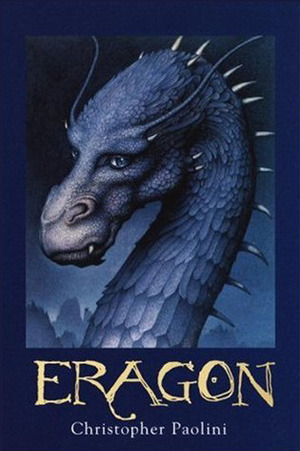 Eragon
Eragon Eldest
Eldest Brisingr
Brisingr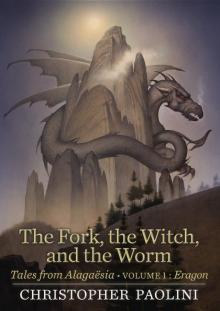 The Fork, the Witch, and the Worm
The Fork, the Witch, and the Worm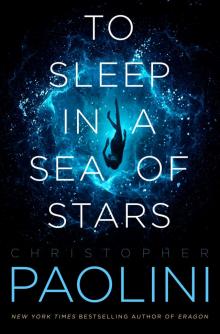 To Sleep in a Sea of Stars
To Sleep in a Sea of Stars![Eldest [en] i-2 Read online](http://i1.bookreadfree.com/i/03/19/eldest_en_i-2_preview.jpg) Eldest [en] i-2
Eldest [en] i-2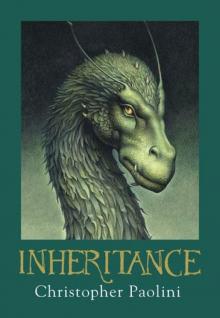 Inheritance i-4
Inheritance i-4![Brisingr [en] i-3 Read online](http://i1.bookreadfree.com/i1/03/31/brisingr_en_i-3_preview.jpg) Brisingr [en] i-3
Brisingr [en] i-3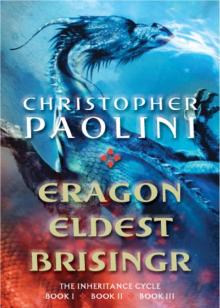 Inheritance Cycle Omnibus
Inheritance Cycle Omnibus